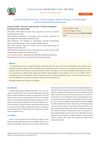
The document concludes that Syndromes of Severe Insulin Resistance are rare disorders with limited treatment options.
[object Object] 
Female hair loss is often hereditary and can be treated with medication, hair transplants, and lasers.
 74 citations,
January 2006 in “The journal of investigative dermatology/Journal of investigative dermatology”
74 citations,
January 2006 in “The journal of investigative dermatology/Journal of investigative dermatology” Mutations in the DSG4 gene can cause a rare hair disorder similar to monilethrix.
 62 citations,
April 2009 in “British Journal of Dermatology”
62 citations,
April 2009 in “British Journal of Dermatology” Epidermal stem cells could lead to new treatments for skin and hair disorders.
 11 citations,
September 2012 in “The journal of investigative dermatology/Journal of investigative dermatology”
11 citations,
September 2012 in “The journal of investigative dermatology/Journal of investigative dermatology” A mutation in the KRT71 gene causes a hair disorder by disrupting hair follicle structure and texture.
 1 citations,
November 2022 in “Journal of Dermatological Treatment”
1 citations,
November 2022 in “Journal of Dermatological Treatment” Platelet-rich plasma can increase hair density and may help treat some skin conditions, but it's costly, not FDA-approved, and needs more research.
 1 citations,
October 2014 in “Paediatrics and Child Health”
1 citations,
October 2014 in “Paediatrics and Child Health” The document concludes that proper diagnosis and management of hair loss in children require a detailed examination and understanding of various hair disorders.
 March 2024 in “Frontiers in endocrinology”
March 2024 in “Frontiers in endocrinology” A new MTX2 gene mutation caused a severe genetic disorder in a young Chinese girl.
 August 2023 in “Acta Scientific Paediatrics”
August 2023 in “Acta Scientific Paediatrics” A baby from an Indian family had a rare genetic disorder causing no scalp or body hair due to a specific gene deletion.
 July 2018 in “Madridge journal of dermatology & research”
July 2018 in “Madridge journal of dermatology & research” Cactus-enriched hair oil effectively reduces hair fall and promotes hair growth with no major side effects.
 November 2013 in “John Wiley & Sons, Ltd eBooks”
November 2013 in “John Wiley & Sons, Ltd eBooks” The document concludes that accurate diagnosis of male and female gonadal disorders is crucial for effective treatment and better patient outcomes.
 8 citations,
February 2005 in “Veterinary dermatology”
8 citations,
February 2005 in “Veterinary dermatology” Chesapeake Bay retrievers' hair loss is likely a breed-specific, hereditary condition linked to abnormal steroid levels and distinct skin changes.
 7 citations,
January 2018 in “Neurodegenerative Diseases”
7 citations,
January 2018 in “Neurodegenerative Diseases” Researchers found a new ABCD1 gene mutation linked to a rare brain and nerve disorder with unusual brain changes.
[object Object]  3 citations,
January 2019 in “Jikken doubutsu ihou/Jikken doubutsu/Experimental animals/Jikken Dobutsu”
3 citations,
January 2019 in “Jikken doubutsu ihou/Jikken doubutsu/Experimental animals/Jikken Dobutsu” Pigs without the Hairless gene showed skin and thymus changes, useful for studying human hair disorders.
 November 2023 in “Frontiers in pharmacology”
November 2023 in “Frontiers in pharmacology” Drug repositioning offers hope for new, affordable treatments for a genetic skin disorder called ARCI.
June 2021 in “International journal of cosmetics and dermatology” Vitamin C and E may help with certain skin and hair conditions, but more research is needed to confirm their effectiveness.
 January 2008 in “Springer eBooks”
January 2008 in “Springer eBooks” Thyroid disease can cause hair loss and treating thyroid problems might help with hair disorders.
 16 citations,
October 2003 in “Journal of The American Academy of Dermatology”
16 citations,
October 2003 in “Journal of The American Academy of Dermatology” A boy had unusual synchronized hair growth with short active growth phases, not fitting known hair disorders.
 2 citations,
March 2020 in “International Journal of Molecular Sciences”
2 citations,
March 2020 in “International Journal of Molecular Sciences” Topical treatments can deliver active molecules to skin stem cells, potentially helping treat skin and hair disorders, including skin cancers and hair loss.
 April 2016 in “Medical Acupuncture”
April 2016 in “Medical Acupuncture” The document concludes that hair loss in women is treated with medications, therapies, and surgery in Western medicine, and with acupuncture and herbs in Chinese medicine, but hereditary hair loss is hard to reverse.
 51 citations,
January 2003 in “Hormone Research in Paediatrics”
51 citations,
January 2003 in “Hormone Research in Paediatrics” Hormones and their receptors, especially androgens, play a key role in hair growth and disorders like baldness.
 23 citations,
February 2004 in “Clinical and Experimental Ophthalmology”
23 citations,
February 2004 in “Clinical and Experimental Ophthalmology” A boy with chromosome 13q deletion syndrome developed eye cancer, a woman with breast cancer lost vision due to a rare side-effect of her treatment, a man's vision worsened after using a hair loss drug, and two rare disorders were discussed. Optical Coherence Tomography is useful for diagnosing and monitoring these conditions.
 23 citations,
November 2001 in “Archives of Dermatology”
23 citations,
November 2001 in “Archives of Dermatology” Genetic discoveries are key for understanding, diagnosing, and treating inherited hair and nail disorders.
 15 citations,
February 2015 in “Cell & tissue research/Cell and tissue research”
15 citations,
February 2015 in “Cell & tissue research/Cell and tissue research” P-cadherin is important for hair growth and health, and its problems can cause hair and skin disorders.
 9 citations,
February 2004 in “Clinical and Experimental Ophthalmology”
9 citations,
February 2004 in “Clinical and Experimental Ophthalmology” The document discusses various eye conditions and their treatments, including a rare eye cancer in a baby, vision loss from a cancer drug, cataracts from a baldness treatment, a rare skin disorder, and a specific type of eye disease diagnosed with a special imaging technique.
 5 citations,
October 2013 in “Veterinary Clinics of North America: Equine Practice”
5 citations,
October 2013 in “Veterinary Clinics of North America: Equine Practice” Some horses lose hair without inflammation or itching due to various conditions, and while mainly a cosmetic issue, diagnosis requires examination and biopsies, and breeding is not advised if it's hereditary.
 1 citations,
February 1988 in “The BMJ”
1 citations,
February 1988 in “The BMJ” The document explains different hair and scalp conditions, including common hair loss after pregnancy or illness, drug-induced hair loss, hereditary excessive hair growth, patterned baldness, autoimmune hair loss, and permanent loss due to skin disease, with generally limited treatment options.
 September 2009 in “Pediatric Dermatology”
September 2009 in “Pediatric Dermatology” UVB is good for a skin condition in Asian kids, a lotion works for head lice, a drug helps with a skin blistering disorder, a foam reduces itchiness in skin inflammation, birthmarks can be more widespread, and criteria for a neurocutaneous disorder were agreed upon.
 June 1997 in “Australasian Journal of Dermatology”
June 1997 in “Australasian Journal of Dermatology” Researchers found new hair and nail genes, how hair reacts to UV, differences in white and pigmented hair growth, nerve changes in alopecia, treatments for baldness and alopecia, a toenail condition linked to a genetic disorder, and that nail fungus is more common in people with psoriasis.

Hair loss can be caused by hormones, illness, autoimmune disorders, or vitamin deficiencies, and treatments vary depending on the type.





























